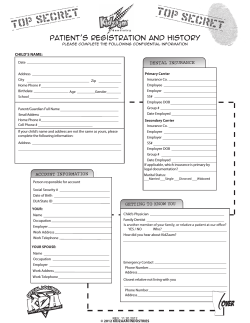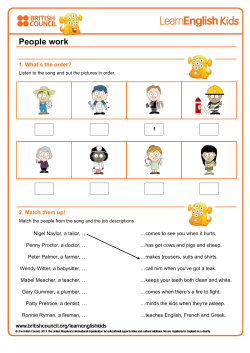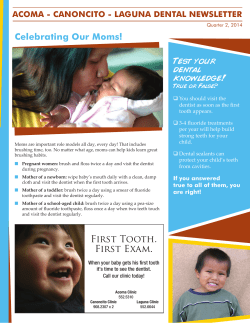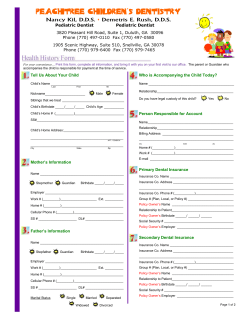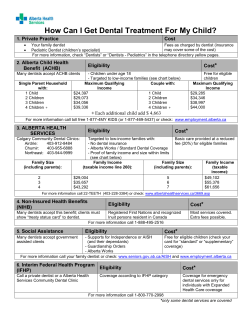
Need a New Dentist? “How to Choose a Dentist
ElmCreekDental.com Need a New Dentist? “How to Choose a Dentist Using 10 Simple Questions” By Dr. Rick Carter Re: Special Report How to Choose a Dentist Using 10 Simple Questions Dear Friend, Although we all know proper dental care is vital to good health, most people don't know how to choose a good dentist for themselves. How can a nondental person know what questions to ask before they choose a dentist? There are two main considerations that will affect your choice--how a dentist treats you as a person and how this dentist will treat your mouth. We suggest you consider these 10 questions to help you choose the quality dental care you need and deserve. 1. How can I directly ask the dentist questions? If the dentist prefers that you usually speak to someone at the front desk or another staff person, then you should begin to wonder how important you are to this average dentist. An outstanding dentist who cares about you will be happy to answer your questions personally. 2. What is the dentist's philosophy for performing dentistry? An outstanding dentist will explain problems and options so you can take part in making decisions about your care. Rather than just telling you what to do, the dentist should explain the results of the exam and work with you to develop a total treatment plan based on the big picture of your oral health and wellness. The dentist and you should decide upon a plan that fits your timeline and your budget, that takes into account your insurance, and that is centered on your needs. 3. What sorts of dental materials does the dentist use? The dentist should be using state-of-the-art materials accompanied with an understanding of the meticulous techniques required for the placement of these restorations. You want a dentist who can provide you with an esthetic, high-quality restoration using materials that will make your teeth look beautiful, comfortable, and long lasting. 4. What continuing education has the dentist had within the past year? Outstanding dentists do not stop learning once they graduate from dental school. They keep up with the latest developments in their field by taking continuing education courses. While every state requires dentists to take a certain number of hours of continuing education every year, outstanding dentists take many more than the required number for licensure. 5. Does the dentist follow OSHA guidelines for infection control? The answer should be an unequivocal yes. That means wearing gloves and a mask, as well as sterilizing hand pieces and all other dental equipment in the office. 6. Does the dentist seem genuinely interested in your general health situation? The dentist should ask for a comprehensive medical history before beginning dental treatment. With a complete medical history, the dentist can determine allergies and possible drug interactions or intolerances. 7. Does the dentist do an oral cancer screening? This should be routine at your initial exam and then followed up at every cleaning appointment. Your dentist needs to look not only at your teeth, but your entire mouth. Take a minute to read this patient’s story… “It Was Just a Little Spot In My Mouth…” We hear about cancer everywhere. It seems that everyone knows someone that has been affected by some form of cancer. Well, I found out that it’s a lot scarier when it’s not someone you hear about – it’s you. It was time for my six-month checkup and cleaning. I expected a routine visit and I would go home and everything would be fine. I was trying out a new dentist a friend of mine recommended. She said the office had a lot of new technology and my visit would be virtually painfree. And it was. Even the x-rays were more advanced. I was able to see the pictures of the x-rays on the TV in the exam room. At the end of the visit he recommended a more advanced screening technique for oral cancer. I had never even realized a dentist was looking for signs of oral cancer during a regular check-up. I thought it was all about cavities and getting a really good cleaning. He explained to me how it worked and that it wouldn't cause any discomfort. He showed me a pen-like device that was really a camera that would allow both of us to see the inside of my mouth in more detail using the same TV where I saw my x-rays. This is when he found a tiny white patch on the inside of my right cheek. He showed me what he had found and explained that, to be sure about a diagnosis, he would need to perform a biopsy. The biopsy proved that the abnormal patch in my mouth was indeed oral cancer. I was shocked, upset, and didn't know what I was going to do. I couldn't believe what my dentist was telling me. I had never smoked or used any kind of tobacco product. How could I have oral cancer? My dentist told me I was lucky. He had found the cancer when it was hardly detectable and he assured me we would be able to effectively treat it. He explained my treatment options. These included everything from surgery, chemotherapy, radiation, and advanced medications. Since the cancer was in the earliest stages, he recommended using surgery to eliminate the cancer. That is what I decided to do. I opted for surgery that would remove the abnormal cancerous tissue from my cheek. It wasn't a pleasant procedure, but I am so happy I opted for the additional cancer screening. I am now happy, health, and cancer-free thanks to my dentist and keeping my regular six-month appointments. I tell everyone I know that it is important to go to the dentist every sixmonths or if something is causing you pain in your mouth. Any irregularity could be a sign of something that needs to be corrected. You may never have cancer, but you’ll always have peace of mind. 8. Does the dentist check thoroughly for gum disease, decay, and correct bite? A thorough initial exam includes using a periodontal probe to probe for six points on each tooth--three on the cheek side and three on the tongue side-to check for the depth of possible bone loss caused by gum disease. A depth of over three millimeters indicates areas of concern. As a follow-up, the dental hygienist should perform periodontal probing at every cleaning. The outstanding dentist should look for decay using the dental pic and should maintain your Decayed, Missing and Filled Teeth record. At the first exam, the jaw and teeth relationship and the contact points in your bite should be checked. This is important because over time, changes in your bite can cause stress and cracked teeth. 9. How available is the dentist? An outstanding dentist will have arrangements for handling emergencies that occur outside of office hours. You may also need a dentist who is available on Saturdays or during the evenings. When you make your first appointment, an outstanding dentist should get you in fairly soon, rather than having you wait several weeks. 10. Is it easy to talk about fees with your dentist? An outstanding dentist should be sensitive to your budget and understanding about your insurance. Your dentist should be willing to discuss fees and payment plans in advance. Don't be embarrassed to ask the dentist about fees because no outstanding dentist will begin treatment without consent or approval. For many dental problems, you should have a choice of treatments so that you can choose the best one for your needs and desires. Finding an outstanding dentist is vital to your family’s oral health and overall happiness. Strong statement? Not when you consider that healthy teeth and gums are now closely linked to overall health, according to many recent studies that have found a connection between what happens in the mouth to diseases in other parts of the body. Recent research findings have linked chronic oral infections to diabetes, heart and lung disease, stroke, and low-birth weight babies. In addition, serious dental problems in your loved ones can undermine their self-esteem, lead to long-term stress and depression and interfere with normal physical functioning, such as breathing, swallowing, eating, and speaking. What this all points to is that optimal oral health points to a favorable future that includes overall health, high self-esteem, self-confidence, regular attendance at school, good grades, graduation, employability, success at job interviews, and perhaps more importantly attainment of satisfying personal relationships. Read this patient’s story to understand the dental-health to heart-health connection… “I’ll Walk You Down the Aisle…” My daughter has met someone special. She thinks he might be the one. I am extremely happy for her, but there is a problem. She is worried I won't be there for her when it is time for me to walk her down the aisle. I'm worried, too. I've already lost my father and two brothers to heart disease and I'm afraid that I am well on my way to following in their footsteps. They were in their early 60's and I am now 58. So, when she told me about the man she met, and how she feels about him, I made a decision. Actually, I've made a few. I decided to visit my regular doctor. During the appointment, I had several tests completed that officially diagnosed me with heart disease. He prescribed medication, exercise, and diet. The exercise and diet part are probably the hardest part of my treatment program. I now have to get up and move instead of sitting on the couch watching countless hours of TV with a bag of potato chips. But I made a promise to myself and to my daughter. I also decided to visit my dentist for a check-up. A friend of mine told me that there is a possible link between heart disease and periodontal disease, also known as gum disease and I wanted to cover all of my bases. My dentist said he was glad that I was taking an active role because I did indeed have the beginnings of periodontal disease and he said I should be treated. I once again thought about my daughter and walking her down the aisle, holding her first child, and eventually, the day she turns 58. So, I knew in addition to the exercise, good diet, and medication from my doctor, I was going to have to take more drastic steps and treat my periodontal disease with regular periodontal treatment sessions. I decided to go with the non-surgical route to treat my gum disease. This involved treatment to remove plaque and calculus through scaling. I also started using a special toothpaste and mouthwash. And, of course, that old, reliable enemy of gum disease – flossing. I am so happy with my decision. It was scary to go through some of the tests, but I know with my hard work and regular visits to the dentist I will be there to walk my daughter down the aisle. I'm already starting to feel better. I've also met the man my daughter loves. And now I'm even more excited for her because she deserves the best and he’s as close as I’ve met yet. I want to always be there for her and that's why I'm so happy I've decided to take charge of my health - including my oral health. Get The Full, Healthy Smile of Your Dreams…Now! We offer a full range of dental services and we absolutely never pressure our patients. Ultimately our only job is to make sure you have all the information you need to make an informed decision. So call today and start on the road to a more confident you! Call (763) 416-0606 and schedule your free Smile Consultation! You have nothing to lose, and a great new smile to gain. That will put a smile on my face too! Warmly, Dr. Rick Carter Elm Creek Dental 7870 Main Street Maple Grove, MN 55369 PS. If you can’t use this, please pass it on to a friend. One last thought -- it’s important. If you have any questions, please don’t hesitate to call me at (763) 416-0606. For a Complimentary Smile Evaluation Call Dr. Your Name Here’s office today at: (763) 416-0606 Mention this Free Report and receive a special welcome gift! Dr. Rick Carter Elm Creek Dental 7870 Main Street Maple MN 55369 Copyright 2006,Grove, Curtis Marketing Group, Inc. Copyright 2009, Curtis Group
© Copyright 2025
